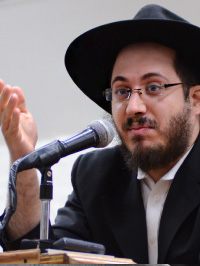FIGHTING AND WINNING THE WAR AT ALL COSTS
Why Remember Yetzias Mitzrayim in the times of Moshiach? * Being that the reason behind the Mitzva is to reinforce our belief in Hashem, it would seem superfluous to have this Mitzva in the times of Moshiach.
 Dear Reader sh’yichyeh:
Dear Reader sh’yichyeh:
One of the most important Mitzvos that we have is the remembrance of Yetzias Mitzrayim – the exodus of Egypt. The Pasuk (D’varim 16:3) says: “You shall not eat leaven with it; for seven days you shall eat with it matzos, the bread of affliction, for in haste you went out of the land of Egypt, so that you shall remember the day when you went out of the land of Egypt all the days of your life.”
The reason behind this Mitzva (see Seifer HaChinuch Mitzva 21): There are many people that like to deny that Hashem exists and is in full control of the creation. At the time of the exodus, Hashem performed many nature-changing miracles which showed beyond a shadow of a doubt that Hashem is in full control of this world.
We find that the accepted Halachic opinion is that we will continue to mention the exodus even in the times of Moshiach. The Mishna (Brachos 1:8) retells of an interesting discussion among the sages: Said Rabbi Elazar ben Azaryah: “Behold, I am like a seventy-year-old man, yet I could not win [the argument against the other sages] having the exodus from Egypt recited at night, until Ben Zoma derived it. For it says ‘In order that you may remember the day when you left Egypt for all the days of your life’. Now, ‘days of your life’ means the days; ‘All the days of your life’ [includes also] the nights.” But the Sages say: ‘Days of your life’ means the present world; ‘All the days of your life’ includes also the era of Moshiach.”
This Halacha obviously demands explanation: Being that the reason behind the Mitzva is to reinforce our belief in Hashem, it would seem superfluous to have this Mitzva in the times of Moshiach. The prophet Yirmiyahu describes the times of Moshiach (31:34) “And no longer shall one teach his neighbor or [shall] one [teach] his brother, saying, ‘Know the Lord,’ for they shall all know Me from their smallest to their greatest, says the Lord, for I will forgive their iniquity and their sin I will no longer remember.”
Similarly, the Rambam in his famous ending to his magnum opus (Hilchos Melachim 12:5) writes: “Therefore, the Jews will be great sages and know the hidden matters, grasping the knowledge of their Creator according to the full extent of human potential, as Isaiah 11:9 states: ‘The world will be filled with the knowledge of God as the waters cover the ocean bed.’”
The Rebbe gives a fascinating explanation:
While the time of Moshiach is a time of serenity and spiritual fulfillment, there is one component missing: the struggle and conquering of our evil inclination. Why do we need this conquering? Why not simply transform the impurity rather than conquering it first? This subjugation has an advantage in that, as the Alter Rebbe writes in the Tanya, a person is a true servant of G-d when he is constantly battling against and subduing his nature. It is a battle which brings G-dly light into the world.
The situation is similar to that of a king who distributes all of his treasures to his soldiers so that they can fight a war. In peace time, these treasures would never have been touched, much less, spent so freely. This war is the battle with the animal soul, and the victory brings treasures of Divine Revelation.
This is another reason why the Egyptian exodus will be mentioned in the Era of Moshiach. By mentioning the struggles of the exodus – and the personal struggles that we had in exile – we will continue to draw-down these special “spiritual treasures.” In the times of Moshiach these treasures will be totally revealed.
 November 21, 2012
November 21, 2012
Reader Comments